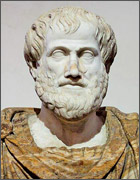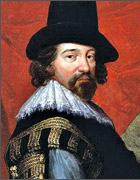Sociological aspects of crime
Dr Ruwan M Jayatunge
The crimes are events and actions that are proscribed by the criminal
law of a particular country (Wilkins 1968). In general, the society and
its existing laws define crime. Sometimes crime in one society may not
be seen as an offence in another society. Sometimes acts of crime depend
on the socio-cultural values, religious belief systems and political
ideology.
 |
 |
 |
|
Aristotle
* Born: 384 BC
* Died: 322 BC (age 61 or 62)
* Era: Ancient philosophy
* Region: Western philosophy
* School: Peripatetic school Aristotelianism
* Main interests: physics, metaphysics, poetry, theatre, music,
rhetoric, politics, government, ethics, Biology, Zoology
|
Sir Francis Bacon
* English philosopher, statesman, scientist, lawyer, author
* Father of scientific method
* Born: January 22, 1561
* Died: April 9, 1626 (aged 65)
* Era: The Scientific Revolution
* Region: Western philosophy School Empiricism
|
Mikhail Baryshnikov
* Born: January 27, 1948
* Profession: Russian dancer, choreographer and actor
* Received Oscar nomination for film The Turning Point’
|
At times crimes vary to society-to-society. Therefore, crime in one
society may not be regarded as a crime in another society. For instance,
homosexuality is a punishable offence in Iran and gay people are viewed
as criminals. Under the Iranian law, if they are found guilty they can
be sent to jail.
In the Western society, gay people have rights and any action that
discriminate them can be challenged in the Court of law.
Bigamy is an offence in the Western world and those who violate
marital law can be prosecuted.
However, in some countries bigamy or polygamy is not an offence and
on most occasions treated as a social norm.
In countries like Saudi Arabia, Sudan, Yemen etc under the Islamic
law polygamy is permitted but under specific conditions. Paedophilia is
rejected by most of the contemporary societies and it is considered as a
crime.
But in the ancient Sparta sexual acts with children were considered
as norm and it was widely practised.
When the prohibition laws were in action in the USA (from 1919 to
1933) the sale, manufacture and transportation of alcohol were banned
nationally. Any people involved in such action were prosecuted.
During the Soviet era any person tried to defect to the West were
treated as criminals, those who tried to defect were prosecuted under
the Soviet law.
For instance, Mikhail Baryshnikov the famous Soviet ballet dancer
defected to Canada in 1974 requesting political asylum. Soon after his
defection, the Soviet authorities pronounced him as a criminal.
Similarly, any Soviet citizen who had American Dollars in their
possession without an official document were arrested and prosecuted
under the Soviet criminal law.
But after the Perestroika these laws became ineffective.
Although crime can vary from society to society and time to time some
crimes such as murder, rape, theft etc often remain constant and in many
societies and these acts are condemned by the people.
various scholars
The Greek Philosopher Aristotle (384 BC - 322 BC) postulated that
poverty is the parent of revolution and crime. The English Philosopher
and the Statesman Sir Francis Bacon (1561 - 1626) stated that
“Opportunity makes a thief” Jean-Jacques Rousseau (1712-1778) believed
that man is naturally good and crime is created by social injustice.
The great writer Leo Tolstoy believed that roots of crime closely
connected with private ownership of property.
Vladimir Lenin was on the view that crime is a product of social
excess.
The Psychoanalyst Sigmund Freud highlighted the innate instincts of
criminality hidden in the human psyche. The French sociologist Emile
Durkheim defined crime as a legal construct resulting from the social
obloquy directed at certain forms of behavior (Durkheim 1958).
Sociological aspects
Sociological aspects of crime can be divided into broad categories in
relation to social determinants. Crime and criminal behavior can be
analyzed through functionalist, conflict, feminist and postmodern
perspectives. Sociological aspects view crime and criminal behaviour as
socially acquired and hence focus on the ways in which cultural and/or
social structural factors are crime producing.
functionalist perspective
Functionalists focus on the individual, usually with the intent to
show how broader social forces mold individual behaviour. They underline
social cohesion as the key factor of social order. Functionalists like
Talcott Parsons attempted to integrate all the social sciences into a
science of human action.
He believed that social system is made up of the actions of
individuals. According to Talcott Parsons equilibrium model society
consists of network of connected parts.
He viewed crime as a disintegrative factor that could affect the
homeostasis of the society.
Based on Talcott model an individual committing homicide has domino
affect and his action reverberates within the society. For instance the
murder of Tori Stafford in 2009 brought horror to her family and created
a nationwide anxiety. To be continued
|



